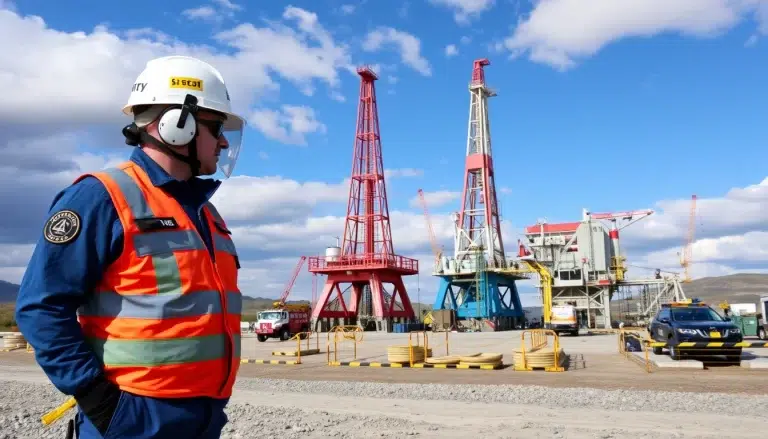Oil and Gas Security Training Course

| Date | Format | Duration | Fees (USD) | Register |
|---|---|---|---|---|
| 02 Dec - 04 Dec, 2025 | Live Online | 3 Days | $2290 | Register → |
| Date | Venue | Duration | Fees (USD) | Register |
|---|---|---|---|---|
| 30 Nov - 02 Dec, 2025 | Amman | 3 Days | $4415 | Register → |
| 08 Dec - 12 Dec, 2025 | London | 5 Days | $5905 | Register → |
Did you know that oil and gas facilities require specialised emergency response equipment including fire suppression systems, spill containment kits, gas detectors, and medical response equipment to minimise damage and protect personnel during incidents?
Course Overview
The Oil and Gas Security Training Course by Alpha Learning Centre is meticulously designed to equip security professionals with essential skills in security risk assessment, physical security, and emergency response planning. This course focuses on how professionals can effectively implement sophisticated security frameworks specific to oil and gas operations, conduct thorough threat assessments, and design resilient protection strategies to ensure comprehensive asset protection in this high-risk sector.
Why Select This Training Course?
Selecting this Oil and Gas Security Course offers numerous advantages for professionals involved in security operations and asset protection in the energy sector. Participants will gain advanced knowledge of cybersecurity for industrial control systems, counter-terrorism measures, and security in hostile environments. The course provides hands-on experience with industry-standard security systems and real-world case studies, enabling attendees to optimise their security management strategies effectively.
For organisations, investing in this training enhances overall security posture and ensures better protection of critical assets. Research indicates that implementing comprehensive security management frameworks results in enhanced ability to protect oil and gas facilities. The GIE Security Risk Assessment Methodology provides a common and integrated approach for European energy infrastructure operators to assess the highest threats of failure and potential consequences to public safety, workers, the environment, and production of gas infrastructure.
For individuals who complete this course will benefit from enhanced career prospects as they become more valuable assets in their respective fields. Studies indicate that professionals with oil and gas security expertise can significantly improve their career trajectory as this course is designed for security managers or consultants in the oil and gas industry, or those seeking work in this sector. By understanding the complexities and differences of managing security in the oil and gas sector, participants can advance their careers in this specialised field.
Transform your oil and gas security capabilities – Register now for this critical advanced training programme!
Who Should Attend?
This Oil and Gas Security Training Course is suitable for:
- Security Managers in oil and gas operations
- Facility Security Officers at oil facilities
- Safety and Risk Analysts in the energy sector
- Emergency Response Coordinators
- Corporate Security Directors in oil companies
What are the Training Goals?
The aim of this course is to:
- Master security in high-risk environments
- Develop strategies for asset protection
- Enhance emergency response in oil and gas
- Ensure compliance with security regulations
- Mitigate threats unique to the oil industry
How will this Training Course be Presented?
The Oil and Gas Security Training Course delivers comprehensive, hands-on training through proven methodologies designed to maximise learning outcomes and practical skill development. Our expert instructors employ the following methods:
- Field-specific security simulations
- Expert lectures on oil and gas security threats
- Interactive workshops on threat management
- Case studies of security incidents in the industry
Each delivery method is carefully integrated to ensure participants gain both theoretical knowledge and practical experience. The course structure promotes active engagement and real-world application, allowing participants to develop crucial analytical and strategic skills within a supportive learning environment.
Join us to experience this dynamic and effective learning approach – Register now to secure your place!
Course Syllabus
Module 1: Security Risk Assessment
- Identifying specific risks in oil and gas
- Asset vulnerability analysis
- Threat profiling for oil operations
- Risk quantification methods
- Security risk mitigation plans
Module 2: Physical Security for Oil and Gas
- Security design for oil installations
- Perimeter security for refineries and platforms
- Access control systems in oil facilities
- Surveillance in hazardous environments
- Protection of pipelines and transport
- Design for blast resistance
- Environmental considerations in security
Module 3: Security Operations Management
- Daily security management in oil operations
- Patrol and guard force management
- Incident response procedures
- Security operations during production phases
- Coordination with law enforcement
Module 4: Cybersecurity in Oil and Gas
- Protecting SCADA and control systems
- Network security for oil infrastructure
- Cyber-attack response strategies
- Integration of IT with OT security
- Data protection in the oil sector
Module 5: Emergency Response Planning
- Oil spill and environmental emergency response
- Crisis management for oil facilities
- Evacuation and rescue operations
- Fire and explosion response
- Continuity planning for oil production
Module 6: Security Legislation and Compliance
- International security standards for oil and gas
- Compliance with maritime security regulations
- Legal aspects of security in the oil industry
- Reporting and documentation requirements
Module 7: Security Training and Awareness
- Training security personnel for oil environments
- Security awareness for all staff
- Drills and exercises specific to oil operations
- Cultural sensitivity in security practices
Module 8: Asset Protection Strategies
- Security for offshore platforms
- Protection of onshore oil facilities
- Safeguarding oil transportation
- Intellectual property and sensitive data protection
Module 9: Counter-Terrorism Measures
- Assessing terrorism risks in oil operations
- Physical security against terrorist threats
- Intelligence and threat information management
- Collaboration with anti-terrorism agencies
Module 10: Security Technology Application
- Use of drones for security surveillance
- Advanced sensor technology for detection
- Biometric systems in oil and gas security
- Integration of AI for threat detection
Module 11: Incident Investigation and Forensics
- Security incident investigation protocols
- Forensic analysis for security breaches
- Evidence collection in oil field incidents
- Legal considerations in incident reporting
Module 12: Security in Hostile Environments
- Operating security in conflict zones
- Managing security during political instability
- Kidnapping and hostage situations in oil operations
Training Impact
The impact of oil and gas security training is evident through various real-world case studies and data, which demonstrate the effectiveness of structured programmes in enhancing operational security and incident response.
Research indicates that professionals with strong oil and gas security skills can significantly improve security outcomes. According to industry experts, case studies from around the world demonstrate that effective security management can prevent disasters and mitigate risks. For example, a major fire outbreak at a refinery in Warri was quickly contained thanks to an advanced foam suppression system, while an oil spill near Warri’s coastline was effectively managed using spill containment kits and vacuum trucks, minimising environmental damage.
These case studies highlight the tangible benefits of implementing advanced oil and gas security techniques:
- Improved protection of critical infrastructure through comprehensive security frameworks
- Enhanced emergency response capabilities in high-risk environments
- Increased efficiency in security operations specific to oil and gas facilities
- Strengthened compliance with security regulations and standards
By investing in this advanced training, organisations can expect to see:
- Significant improvement in security incident prevention
- Improved ability to handle complex security challenges in oil and gas operations
- Enhanced decision-making capabilities in security operations
- Increased competitiveness through comprehensive security management strategies
Transform your career and organisational performance – Enrol now to master Oil and Gas Security!




